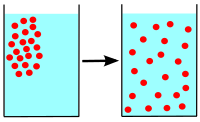
Photo from wikipedia
Brownian yet non-Gaussian processes have recently been observed in numerous biological systems, and corresponding theories have been constructed based on random diffusivity models. Considering the particularity of random diffusivity, this… Click to show full abstract
Brownian yet non-Gaussian processes have recently been observed in numerous biological systems, and corresponding theories have been constructed based on random diffusivity models. Considering the particularity of random diffusivity, this paper studies the effect of an external force acting on two kinds of random diffusivity models whose difference is embodied in whether the fluctuation-dissipation theorem is valid. Based on the two random diffusivity models, we derive the Fokker-Planck equations with an arbitrary external force, and we analyze various observables in the case with a constant force, including the Einstein relation, the moments, the kurtosis, and the asymptotic behaviors of the probability density function of particle displacement at different timescales. Both the theoretical results and numerical simulations of these observables show a significant difference between the two kinds of random diffusivity models, which implies the important role of the fluctuation-dissipation theorem in random diffusivity systems.
Journal Title: Physical review. E
Year Published: 2022
Link to full text (if available)
Share on Social Media: Sign Up to like & get
recommendations!